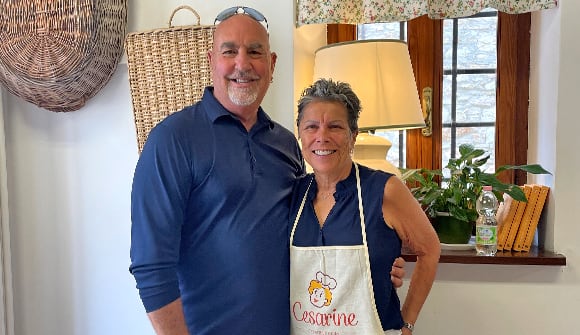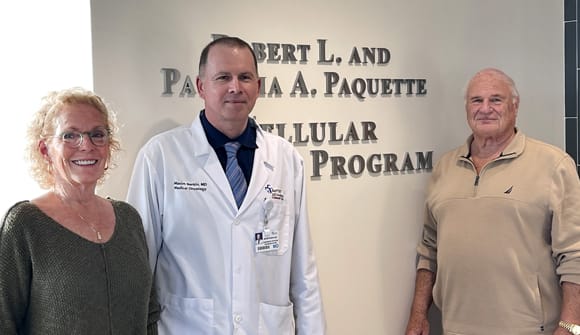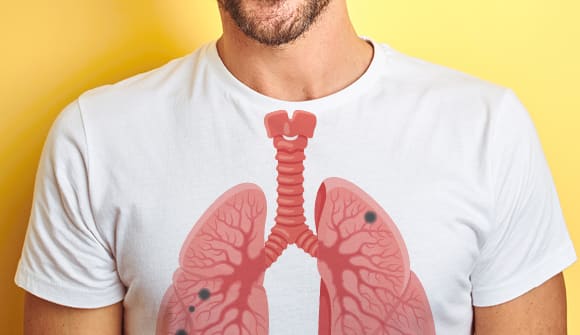Male breast cancer
Men can be at risk, too.
Article Date:

Many people automatically assume that breast cancer is a woman's cancer, but men can get it, too.
According to the National Breast Cancer Foundation, less than 1% of all breast cancer cases develop in men, and only one in 1,000 men will ever be diagnosed with breast cancer.
Although rare, men who are at risk or who display symptoms should get a mammogram.
Breast cancer in men
The Centers for Disease Control and Prevention says the most common kinds of breast cancer in men are the same as those for women, including invasive ductal carcinoma, invasive lobular carcinoma and ductal carcinoma in situ (DCIS).
While there are many similarities between breast cancer in men and women, there are some important differences that may affect early detection in males.
At birth, males and females are both born with a small amount of breast tissue. Once children begin going through puberty, females begin to develop more breast tissue and men do not. According to the American Cancer Society, because men have very little breast tissue, it's easier for them and their health care providers to feel small masses.
On the other hand, because men have so little breast tissue, cancers don't need to grow very far to reach the nipple, the skin covering the breast or the muscles underneath. Even though breast cancer in men tends to be slightly smaller than in women when it's first found, more often it has already spread to nearby tissue or lymph nodes.
It's most common in older men, with most being found after age 50. However, breast cancer can occur at any age.
Men are at low risk
"Most males are very low risk. On average, men have less than a 1% chance of developing breast cancer," said Laila Samiian, MD, director of the breast program at Baptist MD Anderson Cancer Center. "However, men with a family history of breast cancer or a familial genetic mutation such as BRAC1 or BRAC2 have a 5-10% chance of being diagnosed with breast cancer in their lifetime. Therefore, any man with breast cancer deserves genetic testing."
While there is no clear cause of breast cancer in men, there are some risk factors, including:
- Age
- Family history
- BRCA mutations
- Radiation exposure
- Gynecomastia (enlarged breasts caused by a hormone imbalance)
- Obesity
- Race
- Liver disease and alcohol consumption
- Klinefelter syndrome (when a male is born with an extra X chromosome)
- Exposure to estrogen
Men can lower their risk by maintaining a healthy weight, limiting alcohol intake and avoiding smoking. It's recommended that adults get at least 150 to 300 minutes of moderate-intensity or 75 to 150 minutes of vigorous-intensity physical activity each week.
Symptoms of breast cancer
With a diagnosis of breast cancer, men tend to have a higher mortality rate than women. That's primarily because they're less likely to assume a lump is breast cancer, which may cause a delay in seeking treatment.
It's important for men to be aware of symptoms so they can seek help:
- A lump or swelling in the breast
- Red or flaky skin
- Skin dimpling or puckering
- Enlargement of one breast
- Nipple discharge or pain
- Sores on the nipple
- An inverted nipple
- Enlarged underarm lymph nodes
"Men should be aware of any abnormal changes to their breasts and notify their physician of these symptoms right away," said Dr. Samiian. "If a man is displaying symptoms of breast cancer, he should speak with his physician about getting a diagnostic mammogram with a breast ultrasound."
Talk to your doctor about your risks for breast cancer
If you notice changes in the look and feel of your breast, contact your primary care provider. Learn more about breast cancer diagnosis and treatment options at Baptist MD Anderson Cancer Center or by calling 1.844.MDA.BAPTIST (1.844.632.2278).
Sources: Centers for Disease Control, National Breast Cancer Foundation, MD Anderson Cancer Center



